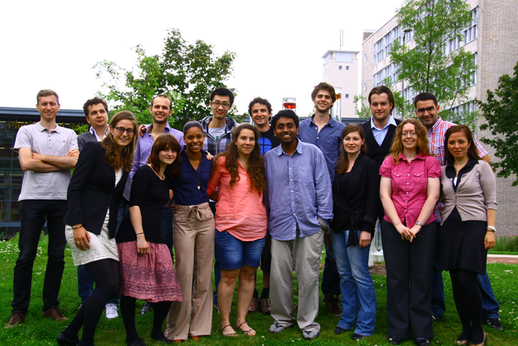Team:TU-Delft
From 2012.igem.org
| Line 72: | Line 72: | ||
<!-- end logo photos --> | <!-- end logo photos --> | ||
<br/><br/><br/> | <br/><br/><br/> | ||
| + | |||
| + | |||
| + | <a href="https://2012.igem.org/Team:TU-Delft/part2#A2" rel="lightbox" title="shmoo"> | ||
| + | <img src="https://static.igem.org/mediawiki/igem.org/b/b2/Silver1.jpg" name="kugroup" width="650" border="0" id="kugroup" /></a></div> | ||
| + | |||
| + | |||
<h2>Project Abstract</h2> | <h2>Project Abstract</h2> | ||
<p>The aim of this year’s iGEM project will be the synthesis of <b>an olfactory device for the purpose of characterization of volatile compound</b>. Here, the aim is to introduce <a href="https://2012.igem.org/Team:TU-Delft/part1#A3">olfactory receptor gene fusions</a> into Saccharomyces cerevisiae and linking these receptors to a <a href="https://2012.igem.org/Team:TU-Delft/part2#A3">transcription response</a>. Aims: | <p>The aim of this year’s iGEM project will be the synthesis of <b>an olfactory device for the purpose of characterization of volatile compound</b>. Here, the aim is to introduce <a href="https://2012.igem.org/Team:TU-Delft/part1#A3">olfactory receptor gene fusions</a> into Saccharomyces cerevisiae and linking these receptors to a <a href="https://2012.igem.org/Team:TU-Delft/part2#A3">transcription response</a>. Aims: | ||
Revision as of 22:36, 26 September 2012

Project Abstract
The aim of this year’s iGEM project will be the synthesis of an olfactory device for the purpose of characterization of volatile compound. Here, the aim is to introduce olfactory receptor gene fusions into Saccharomyces cerevisiae and linking these receptors to a transcription response. Aims:
- The diagnostics of the presence of tuberculosis bacteria in the lungs by sensing chemical compound methyl nicotinate by S. cerevisiae. For diagnostics, the response to these molecules is light, generated by the Lux proteins (visible blue light) or GFP (fluorescent green).
- Introducing receptors for sensing the presence of banana-smell (iso-amyl acetate). This is done to see whether communication between S. cerevisiae and E. coli is possible by this volatile intermediate.
- Supplying a toolkit which allows scientists to introduce olfactory receptors in yeast with minimal effort. Further we want to characterize the receptor parts submitted by the 2009 Hongkong university.
Main Results
- Localization of receptor NR1 using FLAG
- Activation of receptor NR1 by it's native ligand niacin
- Activation of the reporter by the native ligand
- Providing a platform to swap receptors, promoters and terminators easier
Snifferomyces: A Tuberculosis Screening Automaton
The 2012 project of the TU Delft iGEM team, draws inspiration from the sniffer rats which can be trained to sniff out unexploded landmines and tuberculosis. Tuberculosis infects around 8 million people a year and kills approximately 2 million. Drugs to treat tuberculosis have been around for a long time, so a rapid diagnosis system can help curb the spread of the disease. This year our team takes the first steps to make for this problem a screening olfactory automation!
 "
"
















